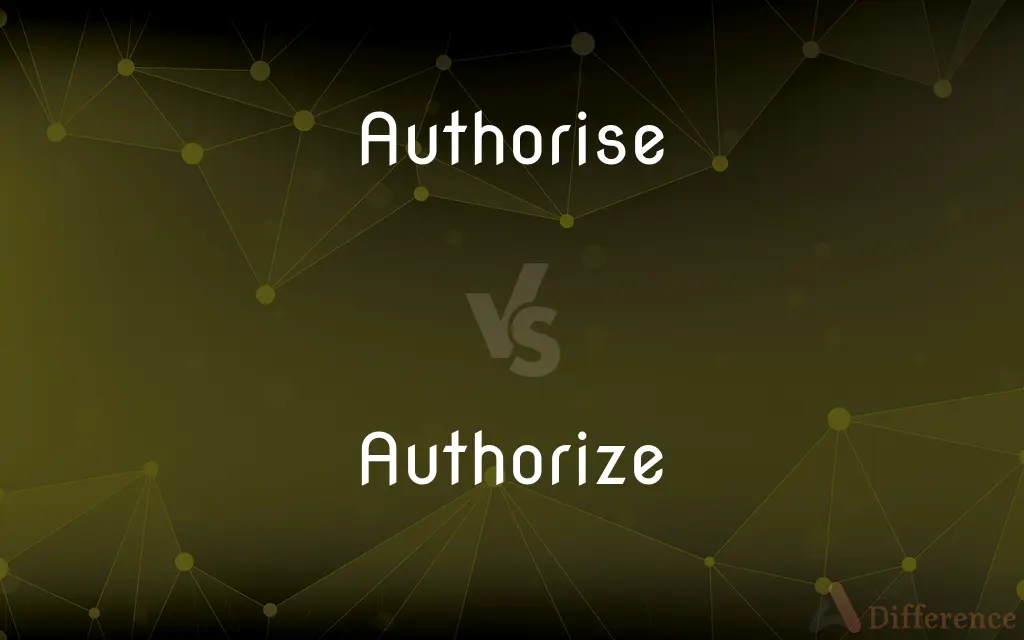Authorise vs. Authorize — What's the Difference?
By Fiza Rafique & Urooj Arif — Updated on March 20, 2024
"Authorise" is commonly used in British English for granting permission, while "Authorize" is the American English spelling, both meaning to officially empower.

Difference Between Authorise and Authorize
Table of Contents
ADVERTISEMENT
Key Differences
Authorise and Authorize, primarily distinguished by their spelling, reflect the difference between British and American English usage. While both terms imply granting permission or power to do something, their spelling is the most evident distinction, stemming from the linguistic preferences of their respective regions.
In British English, "authorise" follows a convention of using 's' in places where American English uses 'z', like in "realise" vs. "realize". This difference is a hallmark of many such verbs, influenced by historical spelling practices and standardisation efforts in both variants of English. Whereas in American English, "authorize" aligns with a general preference for 'z' in verbs, thought to reflect more accurately the pronunciation and to streamline spelling conventions influenced by Noah Webster's reforms.
The choice between "authorise" and "authorize" can also reflect the writer's or speaker's alignment with either British or American English norms, affecting not just spelling but also grammar and vocabulary usage. For instance, a British company might use "authorise" in its official documents and communications, while an American organization would opt for "authorize", signaling not just a linguistic preference but also a cultural and regional identity.
The context of usage can sometimes blur the lines between these variants, especially in international settings or in countries with diverse linguistic influences. For example, in international legal or business documents, the choice of "authorise" or "authorize" might be influenced by the governing law or the intended audience, rather than strict adherence to British or American English norms.
Despite their spelling differences, "authorise" and "authorize" function identically in sentences, carrying the same implications and connotations. Whether a document states that someone is "authorised" or "authorized" to perform an action, the underlying meaning of official permission or empowerment remains constant, unaffected by the regional spelling choice.
ADVERTISEMENT
Comparison Chart
Spelling
Uses 's'
Uses 'z'
Language Variant
Preferred in British English
Preferred in American English
Pronunciation
Similar to Authorize, regional accents may vary
Similar to Authorise, regional accents may vary
Usage Context
More common in UK, Commonwealth countries
More common in the USA, and countries following American English norms
Historical Origin
Reflects older English spelling conventions
Influenced by 19th-century American spelling reforms
Compare with Definitions
Authorise
To grant permission officially.
The council authorised the new building plans.
Authorize
To officially permit or approve.
The president authorized the military strike.
Authorise
To empower someone legally.
The document authorises the attorney to act on behalf of the client.
Authorize
To give legal or formal authority.
This letter authorizes you to access the secure facility.
Authorise
To validate or certify.
The agency is authorised to conduct safety inspections.
Authorize
To sanction or endorse an action.
The committee authorized the budget allocation for the event.
Authorise
To endorse a policy or decision.
The board authorises the strategic plan for the next fiscal year.
Authorize
To validate or legitimize.
The organization is authorized to issue certifications to professionals.
Authorise
To sanction a course of action.
The government authorised the funding for the project.
Authorize
To empower through official documentation.
The license authorizes the holder to operate heavy machinery.
Authorise
Grant authorization or clearance for. Same as authorize.
Authorize
Give official permission for or approval to (an undertaking or agent)
The troops were authorized to use force
The government authorized further aircraft production
Authorise
Give or delegate power or authority to;
She authorized her assistant to sign the papers
Authorize
To grant authority or power to.
Authorise
Standard spelling of authorize
Authorize
To give permission for (something); sanction
The city agency that authorizes construction projects.
Authorise
Grant authorization or clearance for;
Clear the manuscript for publication
The rock star never authorized this slanderous biography
Authorize
(transitive) To grant (someone) the permission or power necessary to do (something); to permit; to sanction or consent to.
The General Assembly authorized the Council to take up the matter.
The judge authorized the wiretapping.
Authorize
To clothe with authority, warrant, or legal power; to give a right to act; to empower; as, to authorize commissioners to settle a boundary.
Authorize
To make legal; to give legal sanction to; to legalize; as, to authorize a marriage.
Authorize
To establish by authority, as by usage or public opinion; to sanction; as, idioms authorized by usage.
Authorize
To sanction or confirm by the authority of some one; to warrant; as, to authorize a report.
A woman's story at a winter's fire,Authorized by her grandam.
Authorize
To justify; to furnish a ground for.
Authorizing himself, for the most part, upon other histories.
Authorize
Grant authorization or clearance for;
Clear the manuscript for publication
The rock star never authorized this slanderous biography
Authorize
Give or delegate power or authority to;
She authorized her assistant to sign the papers
Common Curiosities
Is "authorise" accepted in American publications?
Generally, American publications prefer "authorize", but "authorise" may be accepted in the context of British English or international English usage.
Can "authorise" and "authorize" be used interchangeably?
Yes, they can be used interchangeably, though it's best to stick to one spelling variant for consistency within a document.
Are there any contexts where one spelling is preferred over the other?
Yes, in formal and official documents, it's common to use the spelling that aligns with the regional English variant of the audience or governing law.
Do other English-speaking countries have a preference?
Yes, countries like Canada, Australia, and New Zealand may have their own preferences, often influenced by British English.
How do I know which spelling to use in my writing?
Consider your audience and the standard conventions of the English variant you are using (British vs. American).
Why does British English use "authorise" while American English uses "authorize"?
The difference arises from historical spelling conventions and reforms in each variant of English.
Is the use of "authorise" or "authorize" indicative of the writer's origin?
It can suggest the writer's alignment with British or American English conventions, but it's not a definitive indicator of origin.
Does the difference affect the meaning of the words?
No, the difference in spelling does not affect the meaning. Both imply granting permission or authority.
How has globalization affected the usage of these terms?
Globalization has increased exposure to both variants, leading to more flexibility and interchangeability in international contexts.
What is the main difference between authorise and authorize?
The main difference is spelling; "authorise" is used in British English, while "authorize" is American English.
Can the spelling affect legal documents?
In legal contexts, consistency with the governing law's language variant is crucial, though the meaning remains the same.
Is there a trend towards standardizing the spelling in global English?
While there's some movement towards standardization, regional differences in spelling, grammar, and vocabulary persist.
Does the spelling difference affect pronunciation?
The pronunciation is very similar, with regional accents potentially influencing slight variations.
Are there any rules for converting verbs from British to American English or vice versa?
A common rule is replacing 's' with 'z' in verbs, but there are exceptions and other differences to consider.
Are there tools to help choose between British and American spellings?
Yes, many word processors and writing tools offer language settings to help with spelling preferences.
Share Your Discovery

Previous Comparison
Flush vs. Plumb
Next Comparison
Carmel vs. CaramelAuthor Spotlight
Written by
Fiza RafiqueFiza Rafique is a skilled content writer at AskDifference.com, where she meticulously refines and enhances written pieces. Drawing from her vast editorial expertise, Fiza ensures clarity, accuracy, and precision in every article. Passionate about language, she continually seeks to elevate the quality of content for readers worldwide.
Co-written by
Urooj ArifUrooj is a skilled content writer at Ask Difference, known for her exceptional ability to simplify complex topics into engaging and informative content. With a passion for research and a flair for clear, concise writing, she consistently delivers articles that resonate with our diverse audience.
















































